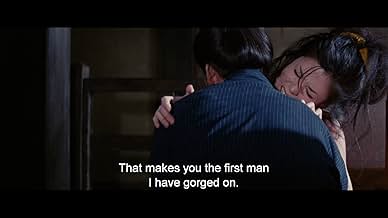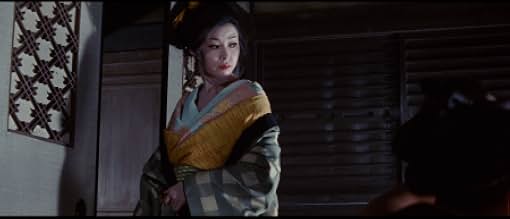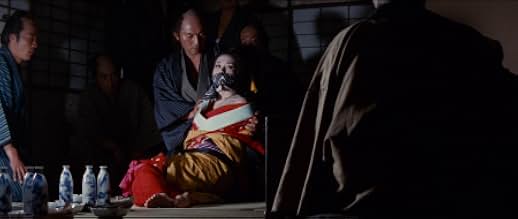IMDb-BEWERTUNG
7,1/10
1526
IHRE BEWERTUNG
Füge eine Handlung in deiner Sprache hinzuA seductive woman gets kidnapped into prostitution. After getting a spider tattoo made on her back, she grows vengeful, leaving several men in her path.A seductive woman gets kidnapped into prostitution. After getting a spider tattoo made on her back, she grows vengeful, leaving several men in her path.A seductive woman gets kidnapped into prostitution. After getting a spider tattoo made on her back, she grows vengeful, leaving several men in her path.
- Regie
- Drehbuch
- Hauptbesetzung
Empfohlene Bewertungen
'Irezumi (1966)' focuses on a young woman who is sold to a geisha house and forcibly tattooed with a grotesque arachnid across her entire back. Deciding not to let her circumstances decide her fate, she opts to embrace the golden orb spider inked into her skin and fully embody its almost otherworldly man-eating nature. With the power of manipulative seduction, she aims to devour every man she can sink her teeth into as a form of revenge for her situation. Unwillingly along for the ride is her fiancée, who is manipulated into serving as his wife-to-be's weapon despite the fact that it tears him apart. In fact, he's pretty much a tool right from the start, as he crumbles to the desires of his lover and buckles under the pressure of her threats, but he only starts to see it once it's too late. The picture is a depiction of a downward spiral, a tragic series of events that escalate into senseless violence and can only end in a similar way. It's also an examination of power within gender dynamics, as its hero is able to use the misogyny of the world around her to her advantage and successfully pull the strings of every single man she encounters. The lead isn't concerned with being likable, she's concerned with getting her own back; this makes for a compelling protagonist whose amorality is only offset by the constant ethical crisis voiced by her meek partner. It's somewhat unconventional in this way, although similar films - like 'Onibaba (1964)' - also reject the standard female stereotype in favour of more complex fare, and it's ultimately quite feminist considering when it was released. It's pretty compelling for its duration, even if it does hit a bit of a lull during its midsection. There are several striking scenes, including a handful of surprisingly brutal moments, and the cinematography is gorgeous throughout. The lead performance is suitably transfixing, too. Overall, this is a really solid thriller with a strong central dynamic and a distinct atmosphere.
Most impressive bloody drama of operatic proportions. Doubly wronged our heroine ends up a geisha with a tarantula tattoo upon her back. Apparently the first part of the Japanese word for tarantula means prostitute and so she feels she has no alternative but to remain in the profession into which she was forced. What she can do though is take revenge and hey does she take revenge. This is beautifully photographed action all the way and it gets plenty bloody, with a wonderfully over the top ending that makes you want to stand and applaud. How much this is a tale of an exploited woman and that of a woman overcoming adversity will be up to each viewer to decide. Gentle eroticism is a bonus and if this is not quite as crazy as the same director's Blind Beast it is just as audacious. Bold, bright and beautiful.
The first thing that stood out to me is how beautifully this movie is shot and has some amazing freeze frames that should be framed on a wall. Having the lead woman have so much control not only when she receives the spider tattoo, but also in her own relationship before it was a surprising thing to see in a movie from the 60s. There is an interesting mystery of how much the spider tattoo is influencing her or if a large part of her actions are a understanding result of her being kidnapped and sold. This movie could have easily gone down the exploitation route, but it clearly had more to say and took itself way more seriously. I am very thankful for that.
A wonderful short movie with beautiful colors and characters acting like they are in Japanese Play, it works so well.
Female main character really sells the sexy but also dangerous kind of woman, that you can never really tell what she is really thinking.
Does she loves you, does she just use you? What is she really on about, she is a spider even before tattoo.
And the sad male mean character that truly displays what a slipper hero is, an goes way to for in this doom relationship.
It feels like watching and old Japanese tale that has been showed in the theater many many times.
It has a good length, but I think the sand of time made it so I didn't enjoy the movie as much if if I watched it when it came out. It's the sad fate of movies that have been built on so much.
Female main character really sells the sexy but also dangerous kind of woman, that you can never really tell what she is really thinking.
Does she loves you, does she just use you? What is she really on about, she is a spider even before tattoo.
And the sad male mean character that truly displays what a slipper hero is, an goes way to for in this doom relationship.
It feels like watching and old Japanese tale that has been showed in the theater many many times.
It has a good length, but I think the sand of time made it so I didn't enjoy the movie as much if if I watched it when it came out. It's the sad fate of movies that have been built on so much.
"Irezumi" (which means "tattoo" in Japanese) is an erotic costume film from one of the bad boys of '60s Japanese cinema. Director Masumura used a full palette of primary colors (with very vivid reds) to tell us about the story of Otsuya, a beautiful young woman from a middle-class merchant family who is abducted into geisha work, and who catches one day the eye of Seikichi, a tattoo master who marks her back with a huge, monstrous spider. From that moment on, Otsuya will take her revenge with every man who shared her bed.
If you have an appetite for perverse stories, try this one. To play Otsuya, Masumura used beautiful actress Ayako Wakao, best remembered in the West for her part in Mizoguchi's "Street of Shame" (1956), where she was Yasumi, the cold-hearted and money-greedy prostitute. She inspired Masumura throughout the '60s, and "Irezumi" is one of their best collaborations. Adapted to the screen by Kaneto Shindo (the internationally acclaimed director of "The Naked Island" and "Onibaba"), the script goes far beyond Junichiro Tanizaki's original short story. In Tanizaki's work, a sadistic tattoo artist searches for his ultimate canvas, a beautiful girl, to create his masterpiece. The girl is innocent until the tattooer finishes "pouring his soul" into her tattoo, which represents a huge tarantula (it is better to know that "tarantula" in Japanese is "jorôgumo" and "jorô" stands for "prostitute", as both attract men to suck their blood). She becomes thus the "femme fatale" of his dreams. In "Irezumi", we never know if Otsuya is evil by nature or if the tattoo is the cause of her misconduct and bad manners, and that's the most fascinating aspect of the film. As it is a "pinku eiga" of the '60s, don't expect graphic sexual scenes but highly suggestive shots (which are more than enough) and enjoy this shameless film. As for me, I still haven't decided yet whether it is a misogynous film or its complete opposite. And what about the spider? It's a... uh, very special piece of art.
If you have an appetite for perverse stories, try this one. To play Otsuya, Masumura used beautiful actress Ayako Wakao, best remembered in the West for her part in Mizoguchi's "Street of Shame" (1956), where she was Yasumi, the cold-hearted and money-greedy prostitute. She inspired Masumura throughout the '60s, and "Irezumi" is one of their best collaborations. Adapted to the screen by Kaneto Shindo (the internationally acclaimed director of "The Naked Island" and "Onibaba"), the script goes far beyond Junichiro Tanizaki's original short story. In Tanizaki's work, a sadistic tattoo artist searches for his ultimate canvas, a beautiful girl, to create his masterpiece. The girl is innocent until the tattooer finishes "pouring his soul" into her tattoo, which represents a huge tarantula (it is better to know that "tarantula" in Japanese is "jorôgumo" and "jorô" stands for "prostitute", as both attract men to suck their blood). She becomes thus the "femme fatale" of his dreams. In "Irezumi", we never know if Otsuya is evil by nature or if the tattoo is the cause of her misconduct and bad manners, and that's the most fascinating aspect of the film. As it is a "pinku eiga" of the '60s, don't expect graphic sexual scenes but highly suggestive shots (which are more than enough) and enjoy this shameless film. As for me, I still haven't decided yet whether it is a misogynous film or its complete opposite. And what about the spider? It's a... uh, very special piece of art.
Top-Auswahl
Melde dich zum Bewerten an und greife auf die Watchlist für personalisierte Empfehlungen zu.
- How long is Irezumi?Powered by Alexa
Details
- Laufzeit
- 1 Std. 26 Min.(86 min)
- Farbe
- Seitenverhältnis
- 2.35 : 1
Zu dieser Seite beitragen
Bearbeitung vorschlagen oder fehlenden Inhalt hinzufügen












